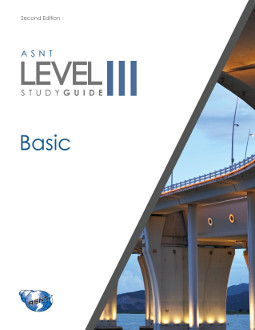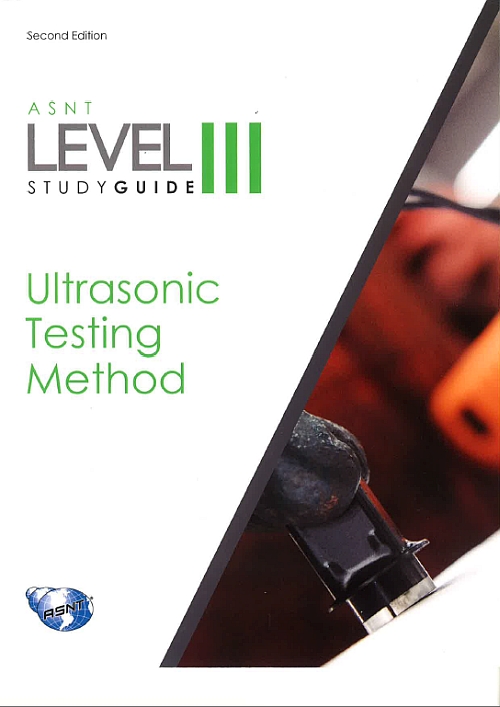Study Guide Level 3 Ndt
Trinity NDT Inspections - NABL Accredited NDT Labs are crucial for assuring and controlling the quality of components and structures during manufacturing and in-service inspections. Destructive and are important part of quality assurance plans to satisfy the client requirements. Destructive tests-DT has limited applications as the product being tested is damaged or destroyed and hence makes tested material seldom useful. – NDT tests will test the materials, structures and components without causing any damage and does not destroy or damage the materials under testing and materials tested can be used for the intended purpose. Are important for functioning and to ensure safety of engineering structures under operation. NDT tests are also used in in-service inspection of process plants, boilers, pressure vessels, aircraft structures and lot more engineering structures.

Today, NDT Technology can prevent catastrophic failures that are caused due to fatigue, thermal stresses, corrosion, creep and other damage mechanisms by detecting flaws in early stages of life. Trinity NDT is a fastest growing company head quartered at Bangalore. NDT Labs at Peenya Industrial Estate, Bangalore are NABL (National Accreditation Board for testing and calibration laboratories, New Delhi, India) accredited, ISO certified to assure best quality professional services. Every NDT test is carried as per approved specifications, customer Our facility is especially equipped to meet standards and customer norms. Details on Aerospace NDT Facilities – Trinity NDT Labs: have the facilities for Water Washable, Post Emulsifiable and solvent removable processes. Penetrants of various sensitivities, acceptance standards are used. Are carried out as per ASTM E1444 or other Aerospace standards.
MPI equipment with capability for Head Shot, Central Conductor and coil shot techniques are used. Facility is suitable for material sorting, thickness gauging, crack detection on aluminium, titanium and other metal structures. Trinity NDT uses modern inspection equipment that can give reliable and accurate test results.systems and are designed to be reliable and accurate to meet Aerospace standard requirements. Know more about facilities.
Nondestructive testing – NDT Inspection Labs: Trinity NDT serves clients through it’s world class infrastructure on Ultrasonic testing, Radiography, X-ray testing, Eddy Current testing, Liquid Penetrant testing and Magnetic particle inspections and Visual Inspections. We offer you consistent, reliable and dependable NDT inspection services. Over 600 satisfied clients are with Trinity NDT, in the progress towards building better and safer world through Nondestructive testing. Trinity NDT labs are NABL accredited and CEMILAC - Center for Military Airworthiness, A Govt of India Defence organization under DRDO, approved to carryout NDT for Airborne Structures for defense applications. Our expertise includes Ultrasonic testing of castings, forgings, Rolled products, machined components, in-service inspection of components and structures during maintenance inspections. Immersion test systems are in place for better sensitivity, accuracy in interpreting the test results and meet productivity targets. Ultrasonic tests are usually carried for detecting internal defects on Castings in foundries, Forgings, Rolled bars, steel Plates, weld joints of fabricated structures, pressure vessels, cross country pipelines, heat exchangers and other petroleum refinery components.
Experienced ASNT NDT Level III and Level II Inspectors are working to deliver professional Ultrasonic Testing. Trinity NDTians are specially trained and experienced to perform critical Ultrasonic inspections as per national and international standards and codes on UT. Water Washable Penetrant testing Technique. Post Emulsifiable testing technique – Hydrophilic and Lipophilic emulsified based systems of various sensitivities up to Sensitivity Level 4.
Solvent removable technique Penetrant testing systems are designed to contain effective pre-cleaning setup for aerospace NDT applications such as Ultrasonic cleaning, Detergent cleaning and Solvent cleaning techniques or other cleaning methods as recommended by the customers. Every test system is designed to meet latest international standards for Aerospace applications and customer specifications. Eddy current testing is one of the modern NDT methods to sort out materials mix up based on composition, heat treatment condition and crack detection of ferrous and non-ferrous materials preferably Aluminium and Magnesium components and heat exchanger tube crack detection. Trinity NDT- Eddy current inspection facility is NABL accredited ISO certified Equipments, probes and coils are suitable to be used for inspection of Aerospace, Heat exchanger tubes, Automobile and other precision components. Our Eddy Current professionals are Level II certified and proficient in carrying out inspections such as Material sorting, paint thickness measurements, material thickness measurements, conductivity measurements, crack detection of metal components. Equipments are capable to be connected to rotating scanners for high speed inspection of Aircraft faster holes and other critical components for aerospace applications.
Facilities at MPI testing Labs: Yoke type, Prod type, and Stationery type - Central Conductor, Head Shot and Coil techniques. Testing equipment at our MPI testing labs are specially designed to meet international standards and codes on Magnetic particle inspection of Automotive, precision components, general engineering and aerospace applications. Trinity NDT level II certified engineers are well trained to perform inspections with great level of accuracy and repeatability.
Magnetic particle testing/crack detection of components and materials can be performed both on site at customer works and at our labs depending on size and quantity of components tested. Prod type MPI testing technique is suitable for rough castings in foundry shops and weld joints in fabrication shops. Prod type equipments are less suitable for finished components, as the surfaces can be damaged due to accidental arcing during MPI testing. Yoke type testing technique is frequently used for testing finished components with great accuracy. Both fluorescent and non-fluorescent techniques of Magnetic particle testing are employed based on requirements of Nationals, International standards, codes, specifications or customer specifications. Central Conductor testing techniques are suitable for testing of hollow components such as pipes, tubes, cylinders, sleeves and other components to inspect for cracks on inner surfaces as well as outer surfaces. Coil type testing technique is used for testing large number of components for circumferential cracks and other discontinuities.

Trinity NDT is a leading Radiography inspection company in India and executed large number of projects across India. Radiography X-ray facilities are approved by Atomic Energy Regulatory Board – AERB, Government of India, Mumbai. Upcoming Radiography Enclosure can handle large number of jobs. Overhead cranes of up to 5T are installed to handle heavy jobs and components.
Radioactive sources-Ir-192 and x-rays are used to find internal defects in Casting and Weld joints. Radiography provides x-ray film as permanent record and is suitable for critical applications such castings and Weld joints, boilers and pressure vessels components. Trinity NDT Labs have film processing dark room facility for film development.
We can mobilize our teams for RT testing onsite for inspection of larger structures which cannot be transported to our Radiography labs. Safety monitoring equipments are in place to ensure the safety of Radiography operations. NDT Labs on Visual testing and well equipped to inspect Weld Joints, Pressure vessels, machined components and fabricated structures.
Free Study Guide Level D Tabe Test
Welding gauges are employed to inspect weld joints for dimensional accuracy as per fabrication codes and drawings. Borescopes and fibre scopes are used for inspecting difficult to access areas during maintenance inspection of boilers, turbines, pipes and pressure vessel components. Trinity NDT Visual testing Level II certified professionals are proficient in carrying our weld inspections before, during and after welding to check the faults in fabrication. Study guide endocrine system anatomy and physiology. Our capabilities on Welding Inspection includes carrying out Welder qualifications testing, Qualifying Certifying Welders and establishing WPS PQR WPQ as per International Welding Codes.
What is Level 3 Basic? The Level 3 Basic Exam gives the candidate a general familiarity of NDT methods as it is their responsibility to acquire knowledge beyond the technical scope of any specific NDT method. It helps to show competence in evaluation and interpretation of results, also sufficient practical knowledge of Product Technology. This broad knowledge may be acquired through a variety of combinations of education, training and experience. What are the responsibilities of a individual who is certified to Level 3? An individual certified to Level 3 has demonstrated competence to perform and direct NDT operations for which he is certified. Lavender International follows the BS EN ISO (PCN) 9712 – NDT Qualification and Certification of NDT Personnel Standard for its Level 3 programmes.
All candidates must pass the Basic Exam first, which remains valid for 5 years, which covers: A) Product Technology B) PCN General Requirements Document C) 4 Methods – General Theory – 15 multiple choice questions on each (note there must be a volumetric method) Then you take the Method Exam D) General Theory E) Specific Training F) Procedure Writing Methods available for Level 3 exams – MT, PT, VT, UTW, UTC, UTWP, UTPA, UTTOFD, RTC, RTW, ETWP, ET Welds. Employer-based schemes A) SNT-TC-1A B) EN 4179 – NAS 410 The Company Written Practice is followed by Lavender International to conduct the Level 3 exam as specified in the document with the approval of the Employer. ASNT NDT Level 3 Lavender International cannot provide ASNT NDT Level 3 exams but can provide advice on the exam and training in preparation for the exam and contact information for exam locations in the UK and worldwide. To progress from Level 2 to Level 3 requires a minimum amount of time spent as a Level 2. However, the time required varies from scheme to scheme and you are advised to review the appropriate scheme document when considering becoming a Level 3. Minimum Duration of Experience for certification at Level 3 (PCN): NDT Method: Work Experience in Months: MT, PT, VT 12 Months UT, RT, ET 18 Months Work experience in months is based on a nominal 40 hours/week or the legal week of work.
When an individual is working in excess of 40 hours per week, he may be credited with experience based on the total hours, but he shall be required to produce evidence of this experience. Further advice can be provided by contacting us at Lavender International.





